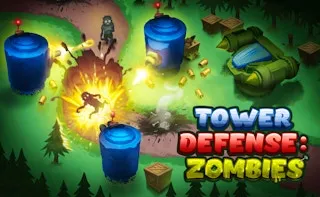Survival Games
18 games in total. Page 1 of 1
Survival: An Immersive Game Genre to Test Your Limits
Survival games push the boundaries of endurance, combining strategy, resource management, and resilience in high-stakes environments. Explore this thrilling genre on PunyGame.The Appeal of Survival Games
Survival games immerse players in hostile environments where the only objective is to stay alive. Whether stranded in a post-apocalyptic world, lost in the wilderness, or fending off zombie hordes, survival games focus on resource management, crafting, exploration, and combat. This genre appeals to a broad audience because of its engaging mechanics, open-ended gameplay, and the primal challenge of self-reliance.What Makes a Survival Game?
At the heart of survival games lies a common theme: adversity. Players are typically dropped into an unfamiliar setting with minimal resources. From there, the challenge is to gather materials, craft tools, and build shelters to fend off various threats. These threats can range from environmental hazards like extreme weather to direct attacks from wildlife, enemies, or even other players in multiplayer modes. Success in a survival game isn’t necessarily about winning—it's about endurance. The mechanics that define the genre are diverse. For instance, games like The Forest offer an eerie survival horror twist where you must fend off cannibals while scavenging for food and supplies. On the other hand, Minecraft, a game with blocky graphics, puts more emphasis on creativity and long-term survival through crafting and building. This variety of gameplay options keeps players hooked, no matter their preferences.Survival in Wilderness: An Age-Old Concept
Survival in wilderness settings brings a sense of realism and raw adventure to gaming. Titles like Don't Starve force players to contend with hunger, weather conditions, and dangerous creatures. The wilderness survival subgenre often mirrors real-life survival skills, such as building shelters, hunting, and fire-starting, adding an educational aspect to the gameplay. Games like UnReal World take this realism to the extreme. Set in Finland during the Iron Age, this game is renowned for its attention to detail, requiring players to manage every aspect of survival from hunting and fishing to foraging and clothing production. The challenge is not just to survive but to thrive in harsh, unrelenting conditions.Resource Management: The Core of Survival Games
A key component in any survival game is resource management. Players must gather essentials like food, water, and materials for shelter and weapons. Often, these resources are finite, which adds a layer of strategy. In The Long Dark, for example, players are placed in a freezing Canadian wilderness, where careful management of body temperature, hunger, and energy is essential for survival. The longer you survive, the more adept you become at balancing these competing needs. Crafting systems are another essential feature. From crude stone tools to advanced weapons, the ability to create useful items from raw materials is a hallmark of survival games. In ARK: Survival Evolved, for instance, players can progress from using simple wooden spears to taming dinosaurs and building complex structures. This gradual progression creates a satisfying gameplay loop, rewarding players for their perseverance.Multiplayer Survival: Competing Against the Elements and Other Players
In multiplayer survival games, the challenges are amplified as you must not only contend with environmental threats but also defend against other players. Games like Rust have popularized this format, creating a high-tension atmosphere where players must build alliances or face off against each other for control of resources. The addition of player-vs-player (PVP) combat introduces another layer of unpredictability. While Minecraft allows for peaceful collaboration or competitive play, games like DayZ thrust players into a cutthroat world where alliances are fragile, and betrayal is common. The social dynamics of multiplayer survival add to the overall complexity of the game, making it a popular choice among fans of competitive gameplay.Exploration and Discovery: The Beauty of Survival Environments
Beyond the immediate survival mechanics, exploration is a central theme in many survival games. Vast, procedurally generated worlds encourage players to venture into the unknown in search of resources and secrets. Titles like Subnautica offer players a chance to explore underwater ecosystems teeming with alien life, blending survival mechanics with awe-inspiring environments. In games like Sons of the Forest, players are dropped into a mysterious island where survival becomes intertwined with uncovering the secrets of the environment. These exploration elements create a sense of wonder and discovery, making each playthrough unique.Innovation in Survival Game Design
The survival genre continues to evolve, incorporating new gameplay elements and technologies. For instance, virtual reality (VR) survival games are beginning to gain traction. Titles like The Solus Project take immersion to the next level by allowing players to experience survival firsthand through VR technology. With advances in AI and procedural generation, future survival games will likely offer even more dynamic and unpredictable worlds. Cross-genre experimentation has led to survival mechanics being incorporated into games outside the traditional survival genre. Games like Tomb Raider and The Last of Us weave survival elements into their story-driven experiences, blending resource management with action-adventure gameplay.The Future of Survival Games
As technology advances, the survival game genre will continue to push boundaries. Whether through more immersive VR experiences, more complex AI-driven ecosystems, or multiplayer worlds that offer both cooperation and competition, survival games are set to become even more engaging. The appeal of survival games lies in their unpredictability and the challenge they present. Each time you enter a survival game, the outcome is unknown. Will you master the wilderness, fend off enemies, or fall victim to the harsh elements? The answer is up to you. By integrating mechanics such as crafting, exploration, and combat, survival games offer a diverse range of experiences that cater to different playstyles. Whether you enjoy peaceful solitude or chaotic multiplayer battles, the survival genre has something for everyone. Survival games test a player’s wit, adaptability, and endurance, offering immersive experiences that go beyond mere entertainment. As this genre continues to grow, it promises to remain a cornerstone of the gaming world, pushing players to their limits in creative and challenging ways.PunyGame © 2022. All rights reserved.

















